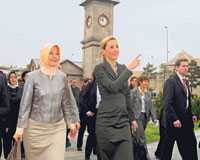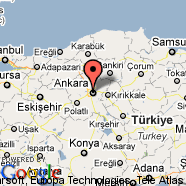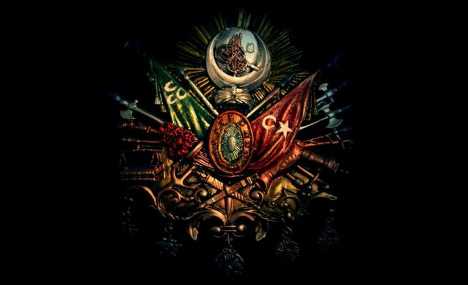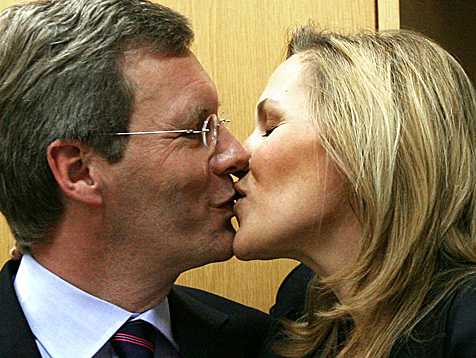| President Abdullah Gül has said Turkey would become stronger with a powerful economy, a better democracy and higher legal standards, and that a strong Turkey would be to the benefit of the world, Europe and its neighbors. | ||
 Attending the Turkish-German Economy Forum on Wednesday in Kayseri, Central Anatolia, with German President Christian Wulff, Gül commenced his speech by welcoming the guests. “It is my pleasure to welcome you to the city in which I was born,” he said.The president said Wulff’s visit adds a fresh impetus to the already-good relations between the two nations, particularly mentioning the role of over 3 million Turks in Germany as a bridge between the two peoples. He said Turks show their fidelity to Germany by integrating into its society while at the same time protecting their Muslim-Turkish identity. He recalled Germany’s past support for Turkey’s membership process to the European Union and asked the “engine of the EU” to continue supporting Turkey’s case. The Turkish president also spoke about the recent success of the Turkish economy and a number of structural reforms that secured the country from the effects of last year’s global economic crisis while pushing Turkey’s economy to new heights. “Trade volume between Turkey and Germany exceeded $30 billion in 2008, but our exports fell as European markets sustained heavy damage from the economic crisis,” Gül said. If Turkey joins the EU, it will have a share in the current pie of wealth, he noted, adding that Turkey will first increase the size of the pie and then take its share. Wulff meets with civil society leadersGerman President Wulff, on an official visit to Turkey amidst a heated debate over the integration of Germany’s immigrant communities into German society, convened with representatives of some of Turkey’s major civil society organizations over breakfast. Osman Güner from the Anatolian Culture Association, Ayhan Bilgen from the Civil Society Development Center, Halime Güner from the Flying Broom, Human Rights Joint Platform (İHOP) General Coordinator Feray Salman and Alevi-Bektaşi Federation President Ali Balkız exchanged opinions with the German president during a one-and-a-half-hour-long meeting. Wulff mainly listened to the participants, taking frequent notes during the meeting, which mainly revolved around the topic of Turkey’s democratization process. The president was particularly interested in the mandatory courses on religion at the primary and high school levels as well as problems faced by Alevis on this issue. He was also curious about how an Alevi dede (religious leader) is trained. In the meantime, Turkey’s first lady, Hayrünnisa Gül, accompanied Bettina Wulff, the wife of the German president, on a tour of Kayseri’s historic sites. The two women first visited the Bürüngüz Mosque before heading to the ages-old covered market. The two women briefly spoke with tradesmen in the bazaar while shopping. One tradesman presented a shawl and a piece of traditional muslin to each woman. Another vendor in the market offered Gül and Wulff some Turkish delight. They later visited a nursing home and spoke with the elderly residents living there. |
||
|
||
| TODAY’S ZAMAN İSTANBUL | ||
Category: Germany
With an estimated number of at least 2.1 million Turks in Germany, they form the largest ethnic minority. The vast majority are found in what used to be West Germany. Berlin, Frankfurt,Hamburg, Rhine-Ruhr (Cologne, Duisburg and Dortmund) have large Turkish communities. The state with the largest Turkish population is North Rhine-Westphalia.
-

President Gül: a powerful Turkey in world’s best interest
-

Turkish pres: Germany must help Turks integrate
 ANKARA, Turkey (AP) — Turkish President Abdullah Gul on Tuesday urged politicians in Germany not to exploit the issue of immigration for political gain and said they should instead help Turks better integrate.
ANKARA, Turkey (AP) — Turkish President Abdullah Gul on Tuesday urged politicians in Germany not to exploit the issue of immigration for political gain and said they should instead help Turks better integrate.Gul was speaking at a joint news conference with German President Christian Wulff who is paying a five-day visit to Turkey as his country’s increasingly debates the integration of millions of foreigners.
German Chancellor Angela Merkel said over the weekend her country’s attempts to build a multicultural society had “utterly failed.” While immigrants were welcome in Germany, they must learn the language and accept the country’s cultural norms, she said, voicing a belief heard increasingly across Europe as it battles an economic slump and worries about terrorism.
“Instead of using the issue of integration politically, everyone must help reach a solution,” Gul said.
Gul said Turks living in Germany should learn to speak German “for their own sakes, for the sake of their families, and so that they may be of use for their environment and society.”
The Turkish president said however, both Germany and Turkey had failed to provide sufficient guidance to Turkish immigrants, many of whom went to Germany as “guest workers” in the 1960s to provide manpower for Germany industry as it was rebuilding after World War II.
“We should not blame them,” he said. “Many went to German cities (from Turkish villages) without even having seen a Turkish city. Neither we nor you were able to provide the necessary leadership.”
Wulff said that many immigrants had successfully integrated in Germany but said Germans’ fears over “religious fundamentalism and terrorism” cannot be ignored.
He said immigrants had to learn German from a “very early age.”
“They have to integrate into the German lifestyle, they must show respect to German society,” he said.
Before his arrival, Wulff sparked a debate in Germany by saying “Islam now also belongs to Germany” in his speech marking 20 years of German reunification.
Germany is home to an estimated 5 million Muslims, including some 3 million Turks.
Many immigrants speak little or no German, work in low paying jobs or live off of government handouts at the same time the country faces an aging population and a shortage of highly skilled workers.
Copyright © 2010 The Associated Press. All rights reserved.
-

Turkish hackers hacked CDU websites
Two regional websites for Chancellor Angela Merkel‘s Christian Democrats (CDU) were hacked on Tuesday by unknown perpetrators claiming to be Turkish following controversial comments by her conservatives on immigration.

Police and domestic intelligence agencies are now investigating in both the city-state of Hamburg and the northern state of Mecklenburg-Western Pomerania after CDU officials said their party sites were paralysed overnight when hackers replaced their homepages with a black background featuring a Turkish crest and critical comments.
Hackers “GHoST61” and “Emre Y” had left their mark claiming responsibility for sabotaging the site, with the comment, “Hi Hamburg: We are from Turkey.”
In Hamburg the CDU took its website offline by mid-morning on Tuesday, spokesperson Anna Christina Hinze said.
The Mecklenburg-Western Pomeranian arm of the CDU had a similar experience, discovering that their website had been replaced with an Ottoman Empire crest and some pointed questions about the party’s immigration policies. Their site was repaired by afternoon.
The hackers left a message asking: “Where is the money for integration? Where is the money for mosques?” and “Where is the tolerance? Where is the freedom of religion?“
The cyber-attacks appear to have been sparked by anti-immigrant statements from conservatives such as Bavarian premier Horst Seehofer, who said last week that Germany should halt immigration from Turkey and Arabic countries. Over the weekend he also said that multiculturalism was dead in Germany. Chancellor Merkel agreed the concept had “completely failed” and demanded immigrants accept “Christian values” when they come to Germany.
At the end of the hacker missive they wrote, “Mrs. Merkel, we await you in Hamburg,” – a possible reference to Merkel’s plans to visit integration projects in the city in early November.
The chancellor’s parliamentary district is in the state of Mecklenburg-Western Pomerania.
In early 2008, hackers made a similar attack on the state of Schleswig-Holstein’s CDU website, putting Turkish flags and slogans on several local party chapter pages. The IP address was traced to Ankara, Turkey.
The Local
-

Integration, religious freedoms weigh heavily during Wulff visit
German President Christian Wulff was to arrive in Turkey later on Monday for a five-day visit that comes amid a heated debate in Germany on the integration of Muslim immigrants, an overwhelming majority of whom are Turks.  In a sign that religious freedoms will also be high on the agenda, Wulff will visit religious sites in İstanbul and in the southern Turkish town of Tarsus and have talks with the head of the Religious Affairs Directorate, Ali Bardakoğlu, in Ankara and the Greek Orthodox patriarch, Bartholomew, in İstanbul.Another highlight of the visit is an address by the German president to the Turkish Parliament, which is scheduled for today. The integration of 2.5 million Turks into German society is likely to be a key issue in Wulff’s address. Wulff, the first German president to visit Turkey in 10 years, has won praise from Turkish and other Muslim immigrants when he said earlier this month that Islam was a “part of Germany.” But these remarks have also set off a row in Germany, prompting German Chancellor Angela Merkel to say that German culture is based on “Christian and Jewish values.” Wulff, who was recently depicted as a Muslim imam on the cover of a German journal because of his comments on Islam, faces the most difficult visit of his young presidency, according to some in the German media.The debate on the integration of Muslims into German society intensified when Merkel said during a weekend meeting of young members of her Christian Democratic Union (CDU) that Germany’s attempts to create a multicultural society have “utterly failed.” The chancellor, who is under pressure from other conservative politicians to toughen the stance on immigration, said too little had been required of immigrants in the past and repeated her usual line that they should learn German in order to get by in school and have opportunities in the labor market.
In a sign that religious freedoms will also be high on the agenda, Wulff will visit religious sites in İstanbul and in the southern Turkish town of Tarsus and have talks with the head of the Religious Affairs Directorate, Ali Bardakoğlu, in Ankara and the Greek Orthodox patriarch, Bartholomew, in İstanbul.Another highlight of the visit is an address by the German president to the Turkish Parliament, which is scheduled for today. The integration of 2.5 million Turks into German society is likely to be a key issue in Wulff’s address. Wulff, the first German president to visit Turkey in 10 years, has won praise from Turkish and other Muslim immigrants when he said earlier this month that Islam was a “part of Germany.” But these remarks have also set off a row in Germany, prompting German Chancellor Angela Merkel to say that German culture is based on “Christian and Jewish values.” Wulff, who was recently depicted as a Muslim imam on the cover of a German journal because of his comments on Islam, faces the most difficult visit of his young presidency, according to some in the German media.The debate on the integration of Muslims into German society intensified when Merkel said during a weekend meeting of young members of her Christian Democratic Union (CDU) that Germany’s attempts to create a multicultural society have “utterly failed.” The chancellor, who is under pressure from other conservative politicians to toughen the stance on immigration, said too little had been required of immigrants in the past and repeated her usual line that they should learn German in order to get by in school and have opportunities in the labor market.
Official German data show about one in five Turks living in Germany speak either poor German or no German at all and that language difficulties were the main obstacle to the successful integration of Turkish immigrants. Turkish President Abdullah Gül and Prime Minister Recep Tayyip Erdoğan have recently called on Turks to advance their German skills and to speak German “without an accent.”
The debate over Germany’s immigrant community has intensified since former Bundesbank board member Thilo Sarrazin published a book accusing Turkish and Arab immigrants of lowering the intelligence of German society. A survey that was published last week showed that more than one-third of Germans say immigrants, some of whom had been living in the country for more than 40 years, should be sent to their native lands when jobs are scarce. Some 58 percent backed limitations on the religious practices of Muslims, while 10 percent said a “führer” is needed to run the country “with a strong hand.”
Wulff will visit Mustafa Kemal Atatürk’s mausoleum and then proceed to talks with Gül today. He will also have talks with Prime Minister Erdoğan and head of the Religious Affairs Directorate Bardakoğlu before addressing Parliament in the afternoon.
On Wednesday, he will travel to the Central Anatolian province of Kayseri, where Gül is from, to attend a business forum, following which he will fly to the southern province of Adana. On Thursday, he will visit the St. Paul Museum in Tarsus, a former church, and attend a religious ceremony there.
On Friday, the German president will have talks with Patriarch Bartholomew and then visit Sultanahmet Mosque and the Hagia Sophia. He and Gül are then expected to attend a groundbreaking ceremony for a Turkish-German university in İstanbul.
Todays Zaman
-

Wulff visits Turkey as integration row simmers
German President Christian Wulff flew to Turkey Monday for a four-day visit amid a heated debate in his country over the integration of Muslim immigrants, many of them Turkish.

His visit comes just days after Chancellor Angela Merkel weighed in for the first time in a heated debate on immigration, saying that Germany’s attempt to create a multi-cultural society had failed completely.
“Multikulti,” the concept that “we are now living side by side and are happy about it,” does not work, Merkel told a meeting of younger members of her conservative Christian Democratic Union (CDU) party.
“This approach has failed, totally,” she said, adding that immigrants should integrate, learn German and adopt German culture and values.
Germany has four million Muslims among its 82 million inhabitants. Turks form the largest ethnic minority with a 2.5-million-strong presence. While many later generation Turks have integrated with German society, large sections have never learned German and live in closed communities.
In a speech this month, Wulff said Islam was “now part of Germany” but also urged his countrymen and immigrants to make an effort at integration.
In a weekend newspaper interview, Turkey’s Gül also urged Turks living in Germany to master the language of their adopted country.
“When one doesn’t speak the language of the country in which one lives that doesn’t serve anyone, neither the person concerned, the country, nor the society,” Gul told the Süddeutsche Zeitung.
“That is why I tell them at every opportunity that they should learn German, and speak it fluently and without an accent. That should start at nurseries.”
Although traditionally strong, Turkish-German ties have been overshadowed by Merkel’s opposition to Ankara’s bid to join the European Union.
Along with French President Nicolas Sarkozy, Merkel argues that the mainly Muslim country of more than 70 million has no place in Europe and should settle for a “privileged partnership” instead of full membership – a proposal that Turkey categorically rejects.
On the business front, Germany remains Turkey’s principal economic partner – bilateral trade amounted to $23.8 billion (€17 billion euros) in 2009. More than 4,000 German companies operate or have partnerships in Turkey.
Wulff’s visit will also take him Wednesday to Kayseri, a booming industrial city in central Turkey, and then to the nearby Cappadocia region, famous for its cone-shaped rock formations, rock-carved underground cities and early Christian churches.
On Thursday he will go to the southern town of Tarsus, the birth place of Saint Paul, to visit the historic Saint Paul’s Church.
He will then fly to Istanbul, Turkey’s cultural and economic hub, where he will meet Ecumenical Patriarch Bartholomew I, the spiritual leader of the world’s Orthodox Christians, on Friday.
Wulff will tour the city’s historical sites and lay the foundation of the Turkish-German university before leaving.
AFP/mry
-

German president goes to Turkey as Islam row rages at home

Berlin/Istanbul – On Monday German President Christian Wulff will arrive in Turkey for his third state visit in his three months since becoming head of state – and this ostensibly ceremonial visit will be the most difficult by far.
On October 3 Wulff, a conservative ally of Chancellor Angela Merkel and former regional premier, added fuel to an increasingly heated debate about the place of Islam in German society.
‘By now, Islam belongs in Germany,’ Wulff said, to the chagrin of many conservative colleagues who wish to preserve what they see as Germany’s mainstream judeo-christian culture.
Since then, Chancellor Merkel has proclaimed that ‘multiculturalism has utterly failed’ in Germany.
Most of Germany’s four million Muslims are of Turkish ethnicity, the families and descendants of the tens of thousands of Anatolians came to the former West Germany as ‘guest workers’ who were greatly needed during the booming economy in the 1960s.
Wulff is set to give a speech before the Turkish parliament on Tuesday, and the event is being keenly awaited, and not just because it is the first time that a German head of state has addressed lawmakers there.
His recognition of Islam as being part of German culture despite the rancour at home has won him the highest praise in Ankara.
‘I very much appreciated his speech on the 20th anniversary of German reunification (October 3),’ Turkish President Abdullah Gul said.
The last time that a head of state from Europe’s largest economy was in Turkey was ten years ago, just after Ankara began the formal negotiations to join the European Union – a process still far from complete.
Merkel, along with French President Nicholas Sarkozy, has repeatedly said that Turkey should be offered a ‘privileged partnership’ with the EU – not full membership.
Despite this, relations between the two states are good, with Turkey’s Prime Minister Recep Tayyip Erdogan attending the Germany- Turkey football match along with Merkel in Berlin in early October.
Wulff’s visit is planned to encompass the whole range of bilateral relations, including the laying of a foundation stone of a German-Turkish university in Istanbul, and talks with religious leaders.
Christian leaders in Turkey complain that their religion has no official legal status, unlike Islam. Wulff is due to meet with the head of the country’s Presidency of Religious Affairs (Diyanet), Ali Bardakoglu.
The issue of the treatment of minorities affects not just Wulff’s visit, but in fact the entire EU negotiations, a fact that frustrates the political elite.
‘The negotiation process is constantly being interrupted by intrigues that no other entry candidate has to put up with,’ says Minister for EU Affairs, Egemen Bagis.
If Wulff is to follow the opinion polls at home, he should not give his Turkish hosts any hope of a full EU membership in the foreseeable future. A poll conducted by the Bild newspaper for Monday’s edition showed some 72 per cent of respondents against Turkey joining as a full member.
